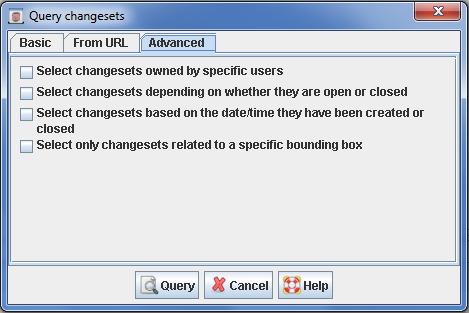| Version 16 (modified by , 6 years ago) ( diff ) |
|---|
Languages:
- English
- español
- français
- Nederlands
- русский
- українська
Changeset Query Dialog
Launching the dialog
The Changeset Query Dialog is launched from the Changeset Manager.
- Launch the Changeset Manager
- Click on
 in the toolbar section of the Changeset Manager
in the toolbar section of the Changeset Manager
The Changeset Query Dialog
Basic Queries
Click on the tab Basic to select one of a set of predefined standard queries.
You can choose among
- Download the latest changesets - this will query and download the latest changesets submitted to the OSM server. Max. 100 changesets are replied. If you select the checkbox Download my changesets only, only the latest changesets submitted by you are queried.
- Download my open changesets - this will query and download the open changesets owned by you. Max. 100 changesets are replied. This query is disabled if you are using JOSM in anonymous mode, i.e. if you didn't enter an OSM user name and password in the JOSM preferences.
- Download changesets in the current map view - this will query the changesets related to the bounding box in the current Map View. This query is disabled unless there is a current map view, i.e. unless there is at least one layer.
Queries from OSM API URLs
You can also copy a query URL used on the OSM Website to define a changeset query in JOSM. In order to do so, copy and paste the URL in the input field in the tab From URL, see below:
You can paste both URL used to query changesets for browsing and URL used to query changesets in the OSM API. Two examples are provided in the dialog, see the screenshot.
If the URL pasted into the input field represents a valid changeset query, the icon 
 .
.
Advanced Queries
It is possible to query changesets on the OSM server based on four criteria:
- based on the changeset owner
- based on whether the changeset is open or closed
- based on when the changeset was created or closed
- based on the area which is affected by the changesets
The Advanced tab provides a UI for defining a changeset query based on these four criteria. There are four checkbox you can select, one checkbox for each kind of query restriction, see below. If a checkbox is selected the respective query restriction will be applied in the query. Depending on the checkbox you select, additional parameters have to be entered, please refer to the following sections.
Query changesets owned by a specific user
You can either restrict the changeset to
- changesets owned by yourself. Note that this option is disabled if you are running JOSM in anonymous mode, i.e. if you don't have an OSM user account or if you didn't enter its name and its password in the JOSM preferences.
- a specific user given its user ID. This is the most precise query option for user based query because the user ID is guaranteed to be unique.
- a specific user given by its user name. This is a slightly less precise query because, for historical reasons, the same user name could be assigned to more than one user.
Query changesets depending on whether they are open or closed
Query changesets based on the date/time they have been created or closed
The OSM API currently supports two kinds of date/time based queries.
- In the first query you have to supply a date/time as parameter. The OSM server replies all changesets closed after this date/time.
- In the first query you have to supply two date/time values as parameters. The OSM server replies all changesets closed after the first date/time and created before the second date/time.
It is not intuitively clear why the OSM server provides exactly these two features for date/time based changeset queries but as of API 0.6 (the current API version) that's what JOSM can and does support.
Date/time values have to be entered as two separate values: (1) a date value and (2) a time value. The time value is optional. Both date and time values can be entered in the format familiar in your locale. Hover over one of the date or time fields to see the list of supporte formats in the tooltip text.
Query changesets covering a specific bounding box
Changesets can be queried based on the area they cover. In order to restrict a changeset query to a specific area you have to enter its bounding box.
Either enter the lower left (minimum latitude/minimum longitude) and the upper right (maximum latitude/maximum longitude) corners or copy/paste a download URL for a specific area in the field URL.
Attachments (8)
- changeset-query-dialog-ss.png (36.8 KB ) - added by 15 years ago.
- basic-tab.png (2.3 KB ) - added by 15 years ago.
- url-based-query.png (36.5 KB ) - added by 15 years ago.
- advanced-tab.png (33.6 KB ) - added by 15 years ago.
- advanced-based-on-user.png (5.5 KB ) - added by 15 years ago.
- advanced-based-on-openclosed.png (4.1 KB ) - added by 15 years ago.
- advanced-based-on-datetime.png (5.8 KB ) - added by 15 years ago.
- advanced-based-on-bbox.png (5.0 KB ) - added by 15 years ago.
Download all attachments as: .zip










